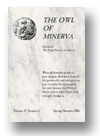|
|
|
1.
|
The Owl of Minerva:
Volume >
37 >
Issue: 2
William Maker
Hegel and Rorty, or, How Hegel Saves Pragmatism from Itself
abstract |
view |
rights & permissions
| cited by
This paper argues that Hegel and Rorty agree in rejecting foundationalism, but diverge significantly in their critiques of it, with important consequences for their visions of postfoundational discourse. An analysis of the Phenomenology of Spirit indicates how Hegel effects a thoroughly immanent critique of foundationalism. In contrast, the flaws of Rorty’s critique are shown to trap him in a cryptofoundationlism which undermines his efforts to endorse humanism, realism, and pluralism. Hegel’s successful transcendence of foundationalism is disclosed as enabling his postfoundational philosophy which succeeds in providing coherent articulations of the nature and truth of humanism, realism, and pluralism.
|
|
|
|
|
|
|
2.
|
The Owl of Minerva:
Volume >
37 >
Issue: 2
Lars Fischer
Hegel in Support of Jewish Emancipation:
A Deliberate Political Act?
abstract |
view |
rights & permissions
| cited by
Shlomo Avineri first suggested some forty years ago that Hegel’s remarks in favor of Jewish emancipation in the Philosophy of Right were initially made in Heidelberg to support the majority of students within the Allgemeine Burschenschaft there who—against the general consensus within the Burschenschaftenmovement as a whole—insisted on the admission of Jewish students to their fraternity. While Avineri’s account needs to be modified in some respects, the publication of the Wannenmann transcript of Hegel’s lectures in Heidelberg has since confirmed that these remarks were indeed made in Heidelberg and clearly did constitute a deliberate political act.
|
|
|
|
|
|
|
3.
|
The Owl of Minerva:
Volume >
37 >
Issue: 2
Todd Gooch
Max Stirner and the Apotheosis of the Corporeal Ego
abstract |
view |
rights & permissions
| cited by
This paper clarifies Stirner’s relationship to his Left Hegelian contemporaries, Ludwig Feuerbch and Bruno Bauer, by showing how, in The Ego and Its Own, Stirner sought to exploit a fundamental contradiction that he perceived in the humanisitc atheism of Feuerbach and Bauer, and thereby to complete the critique of religious consciousness initiated by them. After having reconstructed Stirner’s position in relation to those of his contemporaries, the paper goes on to identify a significant weakness in it, and to identify resources in Feuerbach’s program for a future philosophy that might be enlisted in response to Stirner. The author argues that the central claim underlying Stirner’s criticism of Feuerbach involves a misconception of Feuerbach’s notion of the Gattungswesen or species-essence. Furthermore, Stirner’s unmitigated epistemological relativism is ultimately incompatible with his materialist ontology.
|
|
|
|
|
book reviews |
|
4.
|
The Owl of Minerva:
Volume >
37 >
Issue: 2
Eric von der Luft
Miscellaneous Writings of G. W. F. Hegel
view |
rights & permissions
| cited by
|
|
|
|
|
5.
|
The Owl of Minerva:
Volume >
37 >
Issue: 2
J. Murray Murdoch, Jr.
Capital as Organic Unity:
The Role of Hegel’s Science of Logic in Marx’s Grundrisse
view |
rights & permissions
| cited by
|
|
|
|
|
6.
|
The Owl of Minerva:
Volume >
37 >
Issue: 2
Robert L. Perkins
Kierkegaard’s Relations to Hegel Reconsidered
view |
rights & permissions
| cited by
|
|
|
|
|
|
|
7.
|
The Owl of Minerva:
Volume >
37 >
Issue: 2
Hegel Society of America Business Meeting, Chicago Il, October 7, 2006:
Minutes
view |
rights & permissions
| cited by
|
|
|
|
|
|
|
8.
|
The Owl of Minerva:
Volume >
37 >
Issue: 2
New Books
view |
rights & permissions
| cited by
|
|
|
|
|
|
|
9.
|
The Owl of Minerva:
Volume >
37 >
Issue: 2
Recent Dissertations
view |
rights & permissions
| cited by
|
|
|
|
|
|
|
10.
|
The Owl of Minerva:
Volume >
37 >
Issue: 2
An invitation to join THE HEGEL SOCIETY OF AMERICA
view |
rights & permissions
| cited by
|
|
|
|
|
|
|
11.
|
The Owl of Minerva:
Volume >
37 >
Issue: 2
Information for Contributors and Users
view |
rights & permissions
| cited by
|
|
|
|
